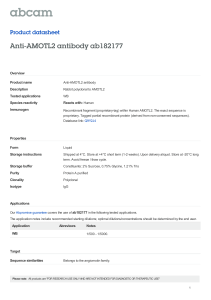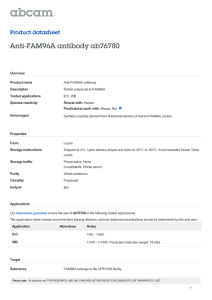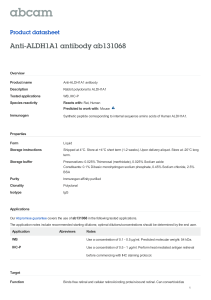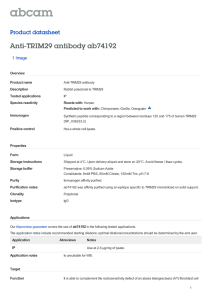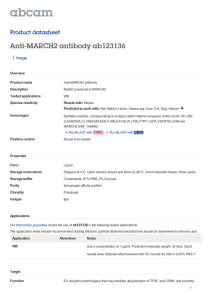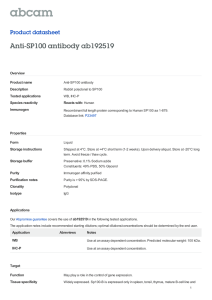Anti-MMS2 antibody ab2513 Product datasheet
advertisement
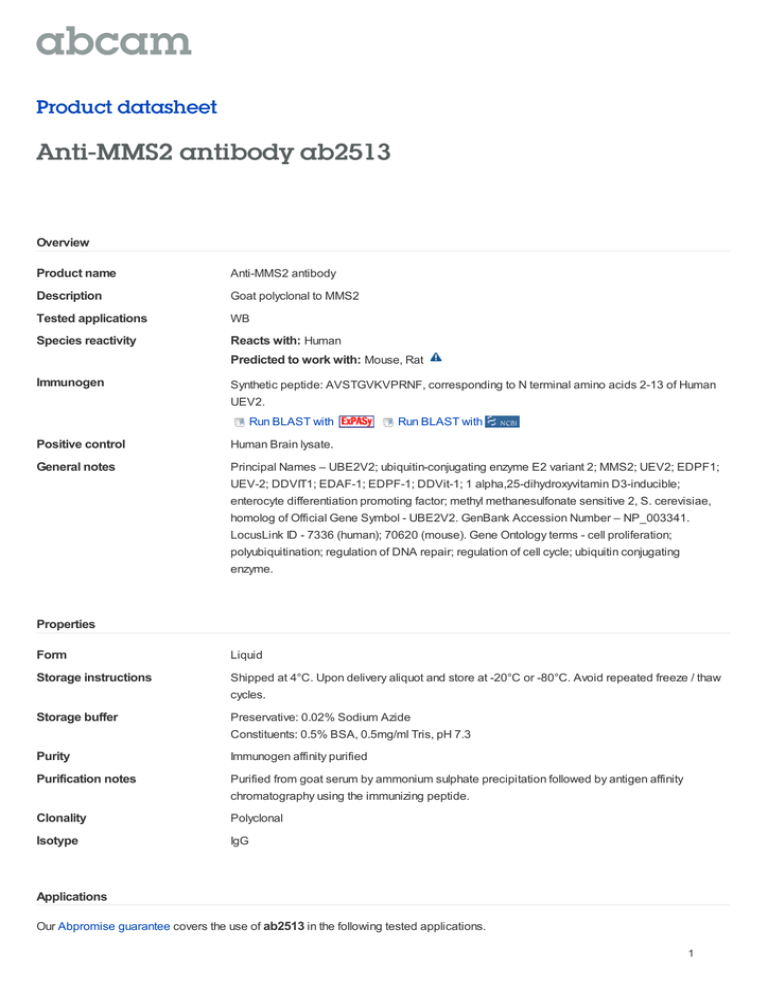
Product datasheet Anti-MMS2 antibody ab2513 Overview Product name Anti-MMS2 antibody Description Goat polyclonal to MMS2 Tested applications WB Species reactivity Reacts with: Human Predicted to work with: Mouse, Rat Immunogen Synthetic peptide: AVSTGVKVPRNF, corresponding to N terminal amino acids 2-13 of Human UEV2. Run BLAST with Run BLAST with Positive control Human Brain lysate. General notes Principal Names – UBE2V2; ubiquitin-conjugating enzyme E2 variant 2; MMS2; UEV2; EDPF1; UEV-2; DDVIT1; EDAF-1; EDPF-1; DDVit-1; 1 alpha,25-dihydroxyvitamin D3-inducible; enterocyte differentiation promoting factor; methyl methanesulfonate sensitive 2, S. cerevisiae, homolog of Official Gene Symbol - UBE2V2. GenBank Accession Number – NP_003341. LocusLink ID - 7336 (human); 70620 (mouse). Gene Ontology terms - cell proliferation; polyubiquitination; regulation of DNA repair; regulation of cell cycle; ubiquitin conjugating enzyme. Properties Form Liquid Storage instructions Shipped at 4°C. Upon delivery aliquot and store at -20°C or -80°C. Avoid repeated freeze / thaw cycles. Storage buffer Preservative: 0.02% Sodium Azide Constituents: 0.5% BSA, 0.5mg/ml Tris, pH 7.3 Purity Immunogen affinity purified Purification notes Purified from goat serum by ammonium sulphate precipitation followed by antigen affinity chromatography using the immunizing peptide. Clonality Polyclonal Isotype IgG Applications Our Abpromise guarantee covers the use of ab2513 in the following tested applications. 1 The application notes include recommended starting dilutions; optimal dilutions/concentrations should be determined by the end user. Application Abreviews Notes WB Application notes Western Blot – Approx 20kDa band seen in Human Brain lysate. Recommended for use at 0.21.0ug/ml. Target Function Has no ubiquitin ligase activity on its own. The UBE2V2/UBE2N heterodimer catalyzes the synthesis of non-canonical poly-ubiquitin chains that are linked through 'Lys-63'. This type of polyubiquitination does not lead to protein degradation by the proteasome. Mediates transcriptional activation of target genes. Plays a role in the control of progress through the cell cycle and differentiation. Plays a role in the error-free DNA repair pathway and contributes to the survival of cells after DNA damage. Tissue specificity Detected in placenta, colon, liver and skin. Detected at very low levels in most tissues. Sequence similarities Belongs to the ubiquitin-conjugating enzyme family. Please note: All products are "FOR RESEARCH USE ONLY AND ARE NOT INTENDED FOR DIAGNOSTIC OR THERAPEUTIC USE" Our Abpromise to you: Quality guaranteed and expert technical support Replacement or refund for products not performing as stated on the datasheet Valid for 12 months from date of delivery Response to your inquiry within 24 hours We provide support in Chinese, English, French, German, Japanese and Spanish Extensive multi-media technical resources to help you We investigate all quality concerns to ensure our products perform to the highest standards If the product does not perform as described on this datasheet, we will offer a refund or replacement. For full details of the Abpromise, please visit http://www.abcam.com/abpromise or contact our technical team. Terms and conditions Guarantee only valid for products bought direct from Abcam or one of our authorized distributors 2
